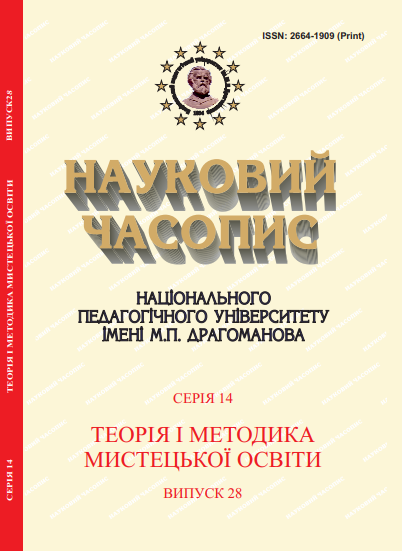Methodological basis of the future musical art teachers’ artistic-projective experience formation
DOI:
https://doi.org/10.31392/NPU-nc.series14.2022.28.08Keywords:
artistic-projective experience, methodological basis, scientific approaches, pedagogical principles of methodological direction, future teachers of musical artAbstract
The article presents the process and result of a theoretical study on substantiation of the methodological basis of the future musical art teachers’ artistic-projective experience formation. Attention is focused on the fact that research is carried out on the basis of piano training, at the same time, presented methodology can be the basis for the formation of the specified professional quality in the conditions of other types of training. The logic of selection of scientific approaches and pedagogical principles provided for the correspondence of each approach to a certain component of the future musical art teachers’ artistic-projective experience. Pedagogical principles that had a methodological character were chosen according to the constructs included in one or another component, namely: methodological-motivated, artistic-thinking, activity-communicative and creative-self-organizing. The feasibility of using the following scientific approaches is substantiated: competence-intentional, cognitive-reflective, communicative-organizational, creative-consolidation. Each of the selected approaches combines two interrelated scientific directions, which corresponds to the polyparadigmatic research methodology, which is used for interdisciplinary phenomena. The competence-intentional approach made it possible to establish the following methodological principles: focus on the competence context of methodological-technological training of future musical art teachers; mastering the pedagogical potential of performance (piano) training as a resource of professional competitiveness. The cognitive-reflective approach led to the introduction of the principle of activation of the artistic-cognitive sphere in the paradigm of polyartistry and the principle of gradual accumulation of experience of emotional attitude reflection and understanding of artistic images as content-projective dominants. The communicative-organizational approach contributed to the introduction of the principle of accumulation of communication experience in various roles and dispositions and gradual assimilation of communicative technologies in the organization of artistic projects. In accordance with creative-consolidation approach, the principle of gradualness in the acquisition of creative independence in the organization of artistic projects and the principle of gradualness in mastering project technologies on the basis of consolidation of one’s own creative resource were chosen. The concept of “artistically integrated project text” was introduced to the scientific thesaurus.
References
Єременко, О. В. (2010). Теорія і методика підготовки магістрів музичного мистецтва в педагогічних університетів (Автореф. д-ра. пед. наук). Київ. Націоналтний педагогічний університет імені М.П.Драгоманова.
Кузнецова, О. А. (2017). Творчо-проективний підхід підготовки майбутніх учителів музичного мистецтва до музично-просвітницької діяльності з учнями. Методичка пракса: часопис за наставу и ученье [гл. учредник доц. др. Зорица Цветановиh]. Броj 4. (сс. 423–429). Београд: Учительски факултет у Враньу и «Школска книга» ДОО у Београду.
Лі, Цзяці. (2017). Методика формування художньо-проектних умінь майбутніх учителів музики в процесі вивчення фахових дисциплін (Дис. канд. пед. наук). Національний педагогічний університет імені М.П. Драгоманова.
Лук’янчиков, М.І. (2017). Формування проектувальних умінь у майбутнього вчителя музики в процесі фахової підготовки. (Дис. канд. пед. наук). Бердянський держ. пед. ун-т. Бердянськ.
Лю, Дзя. (2017). Методика підготовки майбутнього викладача вокалу до інноваційно-фахової діяльності. (Дис. канд. пед. наук), Національний педагогічний університет імені М. П. Драгоманова, Київ.
Лю, Сянь. (2019). Педагогічні умови методично-спрямованої самореалізації майбутніх учителів музичного мистецтва в системі фортепіанної підготовки. (Дисер. канд. пед наук). ПНПУ імені К.Д.Ушинського. Одеса.
Новська, О. Р. (2015). Методика самопроектування фахового розвитку студентів магістратури у процесі музичного навчання в педагогічних університетах. (Дис. канд. пед. наук), Національний педагогічний університет імені М. П. Драгоманова, Київ.
Пань, Шен (2022). Методика формування художньо-педагогічної освіченості майбутніх учителів музичного мистецтва в процесі фортепіанної підготовки. (Дис. доктора філософії. PhD). РНПУ імені К. Д. Ушинського. Одеса.
Пляченко, Т. (2015). Формування фахових компетентностей майбутнього вчителя музичного мистецтва на заняттях з музично-інструментальних дисциплін. Науковий часопис Національного педагогічного університету імені М.П. Драгоманова. Серія 14. Теорія і методика мистецької освіти. 18 (23). С. 146–150.
Попович, Н.М., Буркало, С.М. (2016). Досвід реалізації компетентнісного підходу у неперервній професійній підготовці вчителя музики прогресивних європейських країн. Музичне мистецтво в освітологічному дискурсі. 1. 14-19. https://mmod.kubg.edu.ua/index.php/journal/article/view/6
Чжоу, Є. (2020). Проєктування фортепіанної підготовки майбутніх учителів музичного мистецтва до формування художньо-емоційного досвіду школярів. (Дис. доктора філософії. PhD). РНПУ імені К.Д.Ушинського. Одеса.
Щолокова О.П. (2021) Естетико-синергетичний підхід як методологічна основа підготовки фахівців у галузі мистецької освіти Мистецька освіта: зміст, технології, менеджмент. Зб. Наукових праць. Серія 17, С. 25-29
Яловський, П.М., Безносюк, О.О., (2019). Сутнісна характеристика понять «компетенція», «професійна компетентність учителя музичного мистецтва». Інноваційна педагогіка. 11. Т. 3. 170-174.
Kuznetsova, O. A. (2017). Motivation direction of preparation of future teachers of musical art to productive work with students of general schools Vzdelávanie a spoločnosť ІІ. Vydanie: Pressovska univerzita v Presové, 484–490.
Rebrova, O. (2019). Project activity of future music and choreography teachers and its career guidance function in thesystemof secondary education. In O. Oleksiuk (Ed.), Professional Artistic Education and Culture within Modern Global Transformations (pp. 157-165). Cambridge Scholars Publishing.
Rebrova, O., Oleksiuk, O., Batiuk, N., & Rebrova, H. (2020). Value Intentions in Future Art Teachers’ Professional Training. Journal of History Culture and Art Research, 9(3), 1-16. doi: http://dx.doi.org/10.7596/taksad.v9i3.2714
Walker, R. (1984). Innovation in the music classroom: II. The Manhattanville Music Curriculum Project. Psychology of Music, 12(1), 25–33. doi:10.1177/0305735684121003
Downloads
Published
Issue
Section
License
Copyright (c) 2022 Nauk. čas. Nac. pedagogìčnogo unìv. ìm. M.P. Dragomanova, Ser. 14, Teor. metod. mistec. osv. [Scientific journal NPDU. Series 14. Theory and methodology of arts education]

This work is licensed under a Creative Commons Attribution-NonCommercial-NoDerivatives 4.0 International License.

